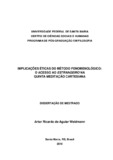| dc.creator | Weidmann, Artur Ricardo de Aguiar | |
| dc.date.accessioned | 2010-07-14 | |
| dc.date.available | 2010-07-14 | |
| dc.date.issued | 2010-03-16 | |
| dc.identifier.citation | WEIDMANN, Artur Ricardo de Aguiar. ETHICAL IMPLICATIONS OF THE PHENOMENOLOGICAL METHOD: ACCESS TO THE ALIEN IN THE FIFTH CARTESIAN MEDITATION. 2010. 95 f. Dissertação (Mestrado em Filosofia) - Universidade Federal de Santa Maria, Santa Maria, 2010. | por |
| dc.identifier.uri | http://repositorio.ufsm.br/handle/1/9087 | |
| dc.description.abstract | This study aims at examining the possibility of an ethical interpretation of the Fifth Cartesian Meditation from a phenomenology of the own and the alien. The methodology used articulates some historic topics in a systematic reconstruction of fundamental concepts of the Husserlian text based on the Cartesian Meditations and also with the help of specialized bibliography. The following steps were taken to achieve that aim. First, the examination and explicitation of the theoretical solipsism problem, the notion of transcedental Ego in Husserl´s work and the constitution of the transcendental Intersubjectivity. The importance that such notion has will be taken into account referring to our conceptual construction on the possibility of consciences communication, that is, of the transcendental Intersubjectivity constitution and, consequently, the constitution of the objective world. The second step will start from the results of the investigation about the constitution of intersubjectivity to examine the category of alterity under the possibility of elaborating a phenomenological ethics based on the concept of responsibility described from inter-human relationships. Contemporary phenomenologists works, like Ricoeur, Lévinas e Waldenfels, will be used as mediators so that we can investigate whether the description of the experience with the alien (not-own) can be read in Husserl as an ethical problem. From those results we will investigate the possible ethical implications contained in the intersubjectivity category. The hypothesis we will be working with is that Husserl would have left open, from the Fifth Meditation, the possibility to think the beginning of a conscience of responsibility from the relation of an own sphere and a alien sphere, as thought of by some of his disciples, which would allow us to think of ethics from Husserl and not the contrary. | eng |
| dc.description.sponsorship | Coordenação de Aperfeiçoamento de Pessoal de Nível Superior | |
| dc.format | application/pdf | por |
| dc.language | por | por |
| dc.publisher | Universidade Federal de Santa Maria | por |
| dc.rights | Acesso Aberto | por |
| dc.subject | Fenomenologia | por |
| dc.subject | Husserl | por |
| dc.subject | Intersubjetividade | por |
| dc.subject | Ética | por |
| dc.subject | Próprio | por |
| dc.subject | Estrangeiro | por |
| dc.subject | Phenomenology | eng |
| dc.subject | Husserl | eng |
| dc.subject | Intersujectivity | eng |
| dc.subject | Ethics | eng |
| dc.subject | Own | eng |
| dc.subject | Alien | eng |
| dc.title | Implicações éticas do método fenomenológico: o acesso ao estrangeiro na Quinta Meditação cartesiana | por |
| dc.title.alternative | Ethical implications of the phenomenological method: access to the alien in the Fifth cartesian Meditation | eng |
| dc.type | Dissertação | por |
| dc.description.resumo | O objetivo geral deste trabalho consiste em examinar a possibilidade de uma interpretação ética da Quinta Meditação cartesiana a partir de uma fenomenologia do próprio e do estrangeiro. A metodologia utilizada articula alguns tópicos históricos em uma reconstrução sistemática de conceitos fundamentais do texto husserliano, com base na obra Meditações Cartesianas, utilizando o auxílio de bibliografia especializada. Os passos do processo são os seguintes: Primeira etapa. Exame e explicitação do problema do solipsismo teórico e da noção de Ego transcendental na obra de Husserl, e a constituição da Intersubjetividade transcendental. Aqui, será levada em conta a importância que tal noção ocupa no que diz respeito à nossa construção conceitual acerca da possibilidade da comunicação das consciências, ou seja, da constituição da Intersubjetividade transcendental, e, por conseguinte, a constituição do mundo objetivo. Segunda etapa. A partir dos resultados da investigação acerca da constituição da intersubjetividade, iremos examinar a categoria da alteridade sob a possibilidade de elaboração de uma ética fenomenológica. Esta baseada no conceito de responsabilidade, descrito a partir das relações inter-humanas. Utilizaremos como interlocutores fenomenólogos contemporâneos tais como Ricoeur, Lévinas e Waldenfels de modo a investigar se a descrição da experiência com o estrangeiro (não-próprio) pode ou não ser lida, já em Husserl, como um problema ético. Partindo desses resultados, investigaremos as possíveis implicações éticas contidas na categoria da intersubjetividade. A hipótese com a qual iremos trabalhar é a de que Husserl teria deixado em aberto, a partir da Quinta Meditação, a possibilidade de pensarmos o início de uma consciência de responsabilidade a partir da relação entre uma esfera própria com uma esfera estrangeira, como pensado por alguns de seus discípulos, o que nos permitiria pensarmos a ética a partir de Husserl e não o contrário. | por |
| dc.contributor.advisor1 | Fabri, Marcelo | |
| dc.contributor.advisor1Lattes | http://lattes.cnpq.br/9122803302644811 | por |
| dc.contributor.referee1 | Sass, Simeao Donizeti | |
| dc.contributor.referee1Lattes | http://lattes.cnpq.br/3097620113806862 | por |
| dc.contributor.referee2 | Rossatto, Noeli Dutra | |
| dc.contributor.referee2Lattes | http://lattes.cnpq.br/2947312243186882 | por |
| dc.creator.Lattes | http://lattes.cnpq.br/9580980777139681 | por |
| dc.publisher.country | BR | por |
| dc.publisher.department | Filosofia | por |
| dc.publisher.initials | UFSM | por |
| dc.publisher.program | Programa de Pós-Graduação em Filosofia | por |
| dc.subject.cnpq | CNPQ::CIENCIAS HUMANAS::FILOSOFIA | por |


